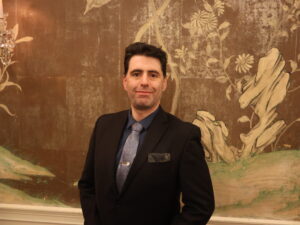Water is a precious commodity, and due to climate change, population growth, and inter-state rivalries and tensions, access to water will become even more vital in the foreseeable future. Two recent memoranda signed by the governments of Kazakhstan and the Netherlands aim to promote greater cooperation on this issue between Astana and its European partner. To efficiently address water-related environmental crises, cooperation is key.

Sanchez WA Headshot.
According to the Dutch embassy in Astana, the two memoranda were signed on 29 May with the Ministry of Water Resources and Irrigation during the late May visit by Dutch Prime Minister Mark Rutte to the Kazakh capital to help create a “resilient and sustainable future.” The memoranda will “focus on strengthening water cooperation and facilitating research, innovation and education in the field of water resources.”
Specifically, one memorandum will “draw on an exchange of experience in the regulation and use of floodwaters, as well as a study of Dutch river flow management,” while the other focuses on providing “training of specialists and interaction with science and innovative technologies in the water industry.” The latter agreement will involve the participation of the IHE Delft Institute for Water Education, located in Delft, The Netherlands.
It is worth noting that the Netherlands is one of many countries and agencies teaming up with Kazakhstan on water-related projects. This September, at the United Nations General Assembly in New York, Kazakhstan and France will co-host the One Water Summit to raise awareness and discuss water challenges in Central Asia and beyond. The French Ministry of Foreign Affairs explains that this format is essential as international water cooperation must be reviewed, while “solutions to guarantee access to water must be completely reinvented, using a multi-actor approach.”
Moreover, in March, the European Bank for Reconstruction and Development announced a loan of up to 47.4 billion tenge (US$105.8 million) to finance the construction of a new wastewater treatment plant to assist the needs of the population of Aktobe.
Water issues across Central Asia are gaining more attention in Washington. I spoke at a George Washington University conference in December about the Aral Sea’s status and future. Other water issues followed in the U.S. capital include the water-related border conflict between the Kyrgyz Republic and Tajikistan, and the planned hydroelectric dam on the Kunar River that the Taliban in Afghanistan aims to build.
Similarly, the health of the Caspian Sea is a topic of growing discussion, as this water body is critical for the success of the Trans-Caspian International Transport Route (TITR), also known as the Middle Corridor. A healthy Caspian is needed for the transport of goods from Aktau to Baku and vice versa. The Caspian was mentioned on several occasions at the May 21 Trans-Caspian Forum in Washington, organized by the Caspian Policy Center.
The prognosis for the future of water across the region is not positive, as Central Asia experienced a massive drought in 2021. In his September 1, 2023, speech, President Kassym-Jomart Tokayev was very direct about the situation, explaining, “the issue of water availability and quality remains critical. Given the growth of population and the economy by 2040, the water deficit in Kazakhstan may reach 12-15 billion cubic meters.”
Thus, water is quickly becoming a priority, as access and usage of water overlap with domestic and foreign policy strategies. The creation of the Ministry of Water and Irrigation demonstrates how Astana acknowledges the importance of water. However, more regional cooperation is needed to ensure that water is used and shared in a responsible manner.
Looking to the future, Kazakhstan can, and should, take a leading role in water issues in the region. Almaty hosted a conference in late May on “pressing issues around sustainable water and land management, energy, food security and environmental sustainability” with Central Asian delegates and international experts, according to the World Bank. Dialogue and cooperation will be necessary to protect the region’s vital resources and to ensure that sharing attitudes, not greediness, prevail.
Besides the One Water Summit, there is another upcoming meeting of note. In November, Azerbaijan will host the COP29 climate conference. While the final agenda has not been released yet, media reports highlight that water will be one of the issues that will be prominently discussed. Astana and Baku have a historical and cultural connection, and the partnership and connectivity have increased in recent years via the Middle Corridor. President Tokayev visited Baku this past March and met with President Ilham Aliyev to further cement bilateral relations. Astana and Baku must work together to ensure that Central Asian and Caucasus water issues (among other environmental challenges) are prominently featured at COP29.
The visit by Dutch Prime Minister Rutte is the latest in a series of high-profile visits to Astana by senior European leaders, including David Cameron, the United Kingdom’s Secretary of State for Foreign, Commonwealth, and Development Affairs, in April, and French President Emmanuel Macron’s visit in late 2023. Visits by heads of state and senior officials are essential to a country’s foreign policy and international image. Still, the agreements and cooperation memoranda, signed during these meetings are equally, if not more, important as they will strengthen bilateral relations to the benefit of the general population.
For Kazakhstan to navigate the turbulent waters of the climate crisis and water-related challenges, good governance, long-term strategies, and reliable partners are all necessary.
The author is Wilder Alejandro Sánchez, the President of Second Floor Strategies, a consulting firm in Washington, D.C. He covers geopolitical, defense, environmental, and trade issues in Central Asia, Eastern Europe, and the Western Hemisphere.
Disclaimer: The views and opinions expressed in this article are those of the author and do not necessarily reflect the position of The Astana Times.
